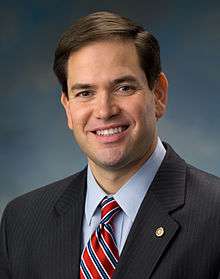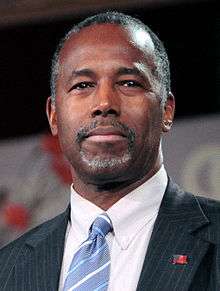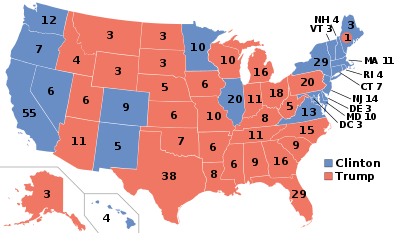United States presidential election in Alaska, 2016
| | |||||||||||||||||||||||||||||||||||||||
| |||||||||||||||||||||||||||||||||||||||
| |||||||||||||||||||||||||||||||||||||||
|
| |||||||||||||||||||||||||||||||||||||||
| Borough & Census Area Results
Clinton—80-90%
Clinton—70-80%
Clinton—60-70%
Clinton—50-60%
Clinton—<50%
Trump—<50%
Trump—50-60%
Trump—60-70%
Trump—70-80%
Trump—80-90% | |||||||||||||||||||||||||||||||||||||||
| |||||||||||||||||||||||||||||||||||||||
| Elections in Alaska | ||||||||
|---|---|---|---|---|---|---|---|---|
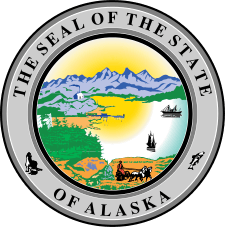 | ||||||||
|
||||||||
|
||||||||
The 2016 United States presidential election in Alaska was held on November 8, 2016, as part of the 2016 General Election in which all 50 states plus The District of Columbia participated. Alaska voters chose electors to represent them in the Electoral College via a popular vote pitting the Republican Party's nominee, businessman Donald Trump, and running mate Indiana Governor Mike Pence against Democratic Party nominee, former Secretary of State Hillary Clinton and her running mate, Virginia Senator Tim Kaine.
Alaska voters expressed their preferences for the Democratic and Constitution presidential nomination in caucuses on March 26. They expressed their preferences for the Republican presidential nomination in caucuses on March 1.
Donald Trump won the election in Alaska with 51.57% of the vote. Hillary Clinton received 36.39% of the vote.[1] Alaska has voted Republican in every election since 1968, and since its admission to the Union in 1959, it has only voted for the Democratic candidate on one occasion: President Lyndon B. Johnson's win in 1964.
The state is known for supporting third parties, including Libertarian candidate Gary Johnson in the 2012 election, in which Alaska was his third-strongest state. He reran as the Libertarian Party's nominee for the 2016 election and appeared on the ballot in Alaska, garnering 5.85% of the vote.
Background
The incumbent President of the United States, Barack Obama, a Democrat and former U.S. Senator from Illinois, was first elected president in the 2008 election, running with former Senator Joe Biden of Delaware. Defeating the Republican nominee, Senator John McCain of Arizona, with 52.9% of the popular vote and 68% of the electoral vote,[2][3] Obama succeeded two-term Republican President George W. Bush, the former Governor of Texas. Obama and Biden were reelected in the 2012 presidential election, defeating former Massachusetts Governor Mitt Romney with 51.1% of the popular vote and 61.7% of electoral votes.[4] Although Barack Obama's approval rating in the RealClearPolitics poll tracking average remained between 40 and 50 percent for most of his second term, it has experienced a surge in early 2016 and reached its highest point since 2012 during June of that year.[5][6] Analyst Nate Cohn has noted that a strong approval rating for President Obama would equate to a strong performance for the Democratic candidate, and vice versa.[7]
Following his second term, President Obama is not eligible for another reelection. In October 2015, Obama's running-mate and two-term Vice President Biden decided not to enter the race for the Democratic Presidential nomination either.[8] With their term expiring on January 20, 2017, the electorate is asked to elect a new president, the 45th President and 48th Vice President of the United States, respectively.
Political landscape in Alaska
The state of Alaska has given its electoral votes to the Republican ticket in every election year since 1968 and only once to a Democratic ticket since statehood. However, in 2012, it had the largest swing in favor of the Democratic Party with President Obama "only" losing by 14 points compared to his 2008 loss by 22 points.[9]
Alaska also has a history of supporting third party candidates at the presidential level. Alaska was the second-best state for Ross Perot in the 1992 election, with Ross Perot garnering 28% of the vote. Alaska was Nader's strongest state in the 2000 presidential election, giving him 10% in his presidential bid.[10] Alaska was also the third-best state for Libertarian nominee Gary Johnson in the 2012 election, giving him 2.46% of the vote, behind Johnson's home state of New Mexico, and Montana.[11] For this reason, Alaska has been considered to be one of Libertarian party nominee Gary Johnson's strongest states in the 2016 election.
Caucuses
The two major parties will choose delegates on different days.[12]
Democratic caucuses
| | |||||||||||||||||||||||||
| |||||||||||||||||||||||||
| |||||||||||||||||||||||||
|
| |||||||||||||||||||||||||
| Alaska results by borough & census area
Bernie Sanders | |||||||||||||||||||||||||
Opinion polling
| Candidate | Popular Vote | District delegates | Estimated delegates | ||||
|---|---|---|---|---|---|---|---|
| Count | Percentage | Count | Percentage | Pledged | Unpledged | Total | |
| Bernie Sanders | 8,447 | 79.6% | 441 | 81.6% | 13 | 1 | 14 |
| Hillary Clinton | 2,146 | 20.2% | 100 | 18.5% | 3 | 1 | 4 |
| Rocky De La Fuente | 1 | 0.0% | |||||
| Martin O'Malley (withdrawn) | 0 | 0.0% | |||||
| Uncommitted | 16 | 0.2% | 0 | 2 | 2 | ||
| Total | 10,610 | 100% | 541 | 100% | 16 | 4 | 20 |
| Source: The Green Papers | |||||||
Republican caucus
| | |||||||||||||||||||||||||||||||||||||||||||||||
| |||||||||||||||||||||||||||||||||||||||||||||||
| |||||||||||||||||||||||||||||||||||||||||||||||
|
| |||||||||||||||||||||||||||||||||||||||||||||||
| Alaska results by borough & census area
Ted Cruz
Donald Trump
Ben Carson | |||||||||||||||||||||||||||||||||||||||||||||||
| Alaska Republican legislative district conventions, March 1, 2016 | |||||
|---|---|---|---|---|---|
| Candidate | Votes | Percentage | Actual delegate count | ||
| Bound | Unbound | Total | |||
| 8,369 | 36.37% | 12 | 0 | 12 | |
| Donald Trump | 7,740 | 33.64% | 11 | 0 | 11 |
| Marco Rubio | 3,488 | 15.16% | 5 | 0 | 5 |
| Ben Carson | 2,492 | 10.83% | 0 | 0 | 0 |
| John Kasich | 918 | 3.99% | 0 | 0 | 0 |
| Unprojected delegates: | 0 | 0 | 0 | ||
| Total: | 23,010 | 100.00% | 28 | 0 | 28 |
| Source: The Green Papers and Alaska Republican Party | |||||
Controversy
At the Republican National Convention, Alaska's floor votes were all recorded for Donald Trump by the convention secretary, even though the Alaska delegation read their votes according to the results of the caucuses- 12 for Cruz, 11 for Trump and 5 for Rubio. An Alaska delegate challenged the results as recorded.[13] However, RNC chair Reince Priebus defended the actions of the convention secretary, saying that the delegates were bound to Trump.[14]
General Election
Statewide Results
| Party | Candidate | Votes | % | |
|---|---|---|---|---|
| Republican | Donald Trump | 130,415 | 51.42 | |
| Democratic | Hillary Clinton | 93,007 | 36.67 | |
| Libertarian | Gary Johnson | 14,593 | 5.75 | |
| Independent | Write-ins | 7,036 | 2.77 | |
| Green | Jill Stein | 4,445 | 1.75 | |
| Constitution | Darrell Castle | 3,156 | 1.24 | |
| Reform | Rocky De La Fuente | 972 | 0.38 | |
| Total votes | 253,624 | 100.0 | ||
Turnout
According to the Alaska Division of Election voter turnout was about 48.4%, 255,700 ballots where casted out of 528,761 voters
See also
- Democratic Party presidential debates, 2016
- Democratic Party presidential primaries, 2016
- Republican Party presidential debates, 2016
- Republican Party presidential primaries, 2016
References
- ↑ "Alaska Election Results 2016 – The New York Times". Retrieved November 29, 2016.
- ↑ "United States House of Representatives floor summary for Jan 8, 2009". Clerk.house.gov. Retrieved January 30, 2009.
- ↑ "Federal elections 2008" (PDF). Federal Election Commission. Retrieved May 11, 2015.
- ↑ "President Map". The New York Times. November 29, 2012. Retrieved May 11, 2015.
- ↑ "Election Other – President Obama Job Approval". RealClearPolitics. Retrieved December 24, 2015.
- ↑ Byrnes, Jesse (2016-06-15). "Poll: Obama approval rating highest since 2012". TheHill. Retrieved 2016-06-19.
- ↑ Cohn, Nate (2015-01-19). "What a Rise in Obama's Approval Rating Means for 2016". The New York Times. ISSN 0362-4331. Retrieved 2016-06-19.
- ↑ "Joe Biden Decides Not to Enter Presidential Race". The Wall Street Journal. Retrieved October 21, 2015.
- ↑ Silver, Nate (December 5, 2012). "Alaska: Future Swing State?". New York Times. Retrieved July 31, 2016.
- ↑ Azari, Julia. "The States That Love (And Hate) Third-Party Candidates". FiveThirtyEight. FiveThirtyEight. Retrieved 15 July 2016.
- ↑ "2012 Presidential General Election Results - Alaska". Dave Leip's Atlas of US Elections. Retrieved 24 October 2016.
- ↑ Kitchenman, Andrew (2016-02-12). "How and when do Alaskans get to weigh in on presidential candidates?". Ktoo.org. Retrieved 2016-11-13.
- ↑ Carlson, Emily. "Chairman of Alaska's Rep party said he doesn't know why 28 delegates went @realDonaldTrump but "it's going to be corrected in record" @ktva". Twitter. Retrieved 23 July 2016.
- ↑ Kopan, Tal; Payson-Denny, Wade. "Why Alaska's delegates were counted for Donald Trump". CNN. Turner Broadcasting System, Inc. Retrieved 23 July 2016.
External links
- RNC 2016 Republican Nominating Process
- Green papers for 2016 primaries, caucuses, and conventions
- 2016 Presidential primaries, ElectionProjection.com
- Decision Desk Headquarter Results for Alaska

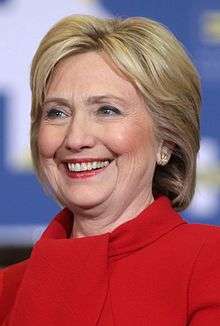


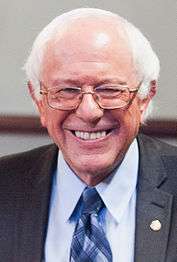

.jpg)
.jpg)
